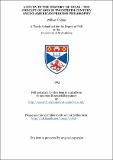A study in the history of ideas : the concept of God in twentieth century Anglo-American process philosophy
Abstract
The concept of God as it is set forth in Charles Hartshorne's panentheism is undoubtedly influenced by the work of Alfred North Whitehead. This is generally acknowledged. What is not fully appreciated, or at least has not been systematized, is that Whitehead's philosophy was not radically novel, but belonged to a particular philosophical perspective, namely British neo-realism. Whitehead's roots in British neo-realism can be demonstrated by a comparative study which includes contemporaries of Whitehead who also belonged to the neo-realistic school. Such a study demonstrates that Samuel Alexander, C. Lloyd Morgan and Whitehead all had similar viewpoints concerning such matters as ultimate reality, a theory of emergence, the dipolarity of nature, and God. Thus, an affinity of thought in these philosophers can be clearly seen. It is therefore the case that Whitehead's influence on Hartshorne was not merely the influence of one man but was also the influence of the philosophical perspective to which that one man belonged, namely British neo-realism. Consequently, Whitehead's influence on Hartshorne resulted in an affinity of thought not only in two men, but also in two philosophies, British neo-realism and American panentheism This research systematically sets forth this affinity in these two schools of thought. Both British neo-realism and American panentheism belong to the wider context of Anglo-American process philosophy. This philosophical perspective is found under examination to be a synthesis of realism and idealism. Thus the British neo-realists, Alexander, Morgan and Whitehead qualify their realism by retaining the concept of "mind" as central to their cosmology. All three philosophers expound a pan-psychistic view of the universe. In America, Hartshorne's panentheism is likewise panpsychistic in viewpoint, and is also a synthesis of realism and idealism. The major influences on Hartshorne were Whitehead and William Ernest Hocking, the American idealist. Hartshorne's panentheism may then best be understood as a synthesis of British neo-realism (from Whitehead) and American idealism (from Hocking). On the basis of the metaphysical principles of process philosophy, we must conclude that the God who is presented is finite. In conjunction with this, while the process concept of God allows explanation for the temporal process, it allows no explanation for temporal or contingent existence. While such must be regarded as a deficiency, nonetheless the process philosophers rightly remind us of the importance of the topic concerning the nature of God.
Type
Thesis, PhD Doctor of Philosophy
Collections
Items in the St Andrews Research Repository are protected by copyright, with all rights reserved, unless otherwise indicated.

